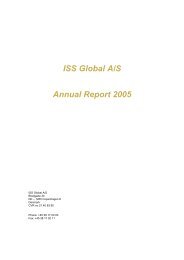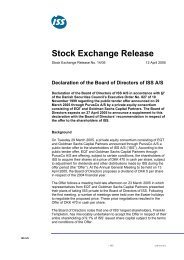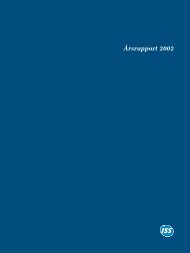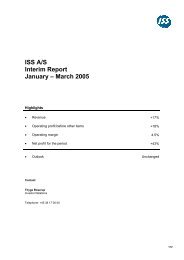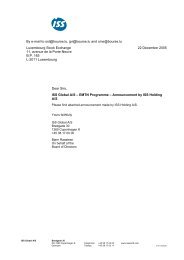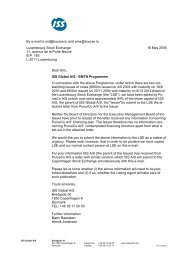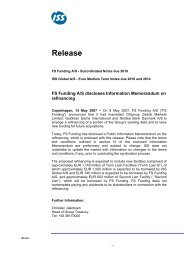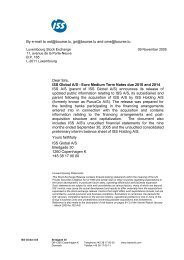Annual Report 2006 ISS Global A/S
Annual Report 2006 ISS Global A/S
Annual Report 2006 ISS Global A/S
Create successful ePaper yourself
Turn your PDF publications into a flip-book with our unique Google optimized e-Paper software.
tual obligations could harm <strong>ISS</strong>’s reputation, as well<br />
as result in customer losses and financial liabilities,<br />
any of which could have a material adverse effect<br />
on <strong>ISS</strong>’s business, results of operations and financial<br />
condition.<br />
<strong>ISS</strong> faces additional risks with respect to its performance<br />
under Integrated Facility Services contracts.<br />
Generally, these contracts place greater demands<br />
on <strong>ISS</strong> due to their scope and complexity as<br />
compared with single service contracts, and these<br />
demands may increase to the extent that the contract<br />
involves newly introduced Facility Services. Although<br />
<strong>ISS</strong> seeks to minimise the difficulties associated<br />
with its Integrated Facility Services contracts<br />
by obtaining a clear understanding of the customer’s<br />
expectations, including defined success criteria, it<br />
may not be able to eliminate these difficulties altogether.<br />
<strong>ISS</strong>’s inability to successfully manage its Integrated<br />
Facility Services contracts could limit its<br />
ability to provide Integrated Facility Services and<br />
may have a material adverse effect on <strong>ISS</strong>’s business,<br />
results of operations and financial condition.<br />
Adverse changes in <strong>ISS</strong>’s financial position, operating<br />
results or cash flows could impact its<br />
credit ratings, loan covenants and ability to finance<br />
its business<br />
Credit rating agencies and debt investors traditionally<br />
use a range of key financial figures, such as operating<br />
margin, cash flow from operating activities,<br />
cash conversion ratio, results of operations, asset<br />
valuations (including any goodwill impairment), interest<br />
coverage and debt ratios, to evaluate <strong>ISS</strong>’s financial<br />
position and performance. Macroeconomic<br />
trends, as well as changes in legislation, impairment<br />
of assets, outsourcing and leasing decisions, staffing<br />
shortages and other operational issues could<br />
cause <strong>ISS</strong>’s key financial figures to fluctuate substantially.<br />
An adverse change in these figures, and<br />
any resulting change in its credit ratings, may affect<br />
<strong>ISS</strong>’s ability to finance its operations, development<br />
and growth. <strong>ISS</strong> evaluates its capital structure regularly<br />
with the aim to manage the development in its<br />
key financial figures to comply with the covenants<br />
specified in its loan agreements. For this purpose,<br />
<strong>ISS</strong> continuously analyses its future capital expenditure<br />
requirements. However, if <strong>ISS</strong> is unsuccessful<br />
in maintaining its key financial figures at a satisfactory<br />
level, any resulting adverse change in its credit<br />
ratings or failure to comply with loan covenants<br />
could have a material adverse effect on <strong>ISS</strong>’s business,<br />
liquidity, results of operations or financial condition.<br />
<strong>ISS</strong> may also be precluded from borrowing<br />
under <strong>ISS</strong>’s lines of credit in those circumstances.<br />
Fluctuations in foreign currency exchange rates<br />
and interest rates may affect <strong>ISS</strong>’s results of operations<br />
Although <strong>ISS</strong> has operations in 49 countries, currency<br />
rate fluctuations generally do not have an immediate<br />
impact on its business because the revenue<br />
and costs of <strong>ISS</strong>’s subsidiaries are usually de-<br />
ANNUAL REPORT <strong>2006</strong> / Risk Factors<br />
nominated in the same currency. However, fluctuations<br />
in exchange rates may affect <strong>ISS</strong> to the extent<br />
that its interest payments with respect to borrowings<br />
are not denominated in the same currencies as<br />
<strong>ISS</strong>’s revenue. In addition, currency movements<br />
may materially affect the economic environment in<br />
which <strong>ISS</strong>’s subsidiaries operate, which could have<br />
a material adverse effect on <strong>ISS</strong>’s business, results<br />
of operations and financial condition. Further, currency<br />
fluctuations may have a significant affect on<br />
royalties, dividends and service fees which are paid<br />
to <strong>ISS</strong> in local currency by <strong>ISS</strong>’s subsidiaries. Currency<br />
fluctuations may also have a significant impact<br />
on the year-on-year growth of revenue, earnings<br />
and cash flow when measured in <strong>ISS</strong>’s reporting<br />
currency, Danish kroner. Currency fluctuations<br />
may cause actual growth rates to fall short of management’s<br />
forecasts and expectations.<br />
<strong>ISS</strong> may also be affected by changes in interest<br />
rates. Increases in interest rates increase <strong>ISS</strong>’s interest<br />
expenses relating to variable rate indebtedness<br />
and increase the costs of refinancing existing<br />
indebtedness and of issuing new debt. In addition,<br />
increases in interest rates increase the funding cost<br />
of acquisitions, thereby limiting <strong>ISS</strong>’s ability to grow<br />
through acquisitions on a cost effective basis, as<br />
well as limiting <strong>ISS</strong>’s ability to implement its growth<br />
strategy. Accordingly, higher interest rates could<br />
adversely affect cash flow and <strong>ISS</strong>’s ability to service<br />
its debt. Although <strong>ISS</strong> monitors and assesses<br />
trends in interest rates on an ongoing basis, there<br />
can be no assurance that <strong>ISS</strong> will be successful in<br />
responding to interest rate variations.<br />
<strong>ISS</strong>’s international operations and decentralised<br />
organisational structure may subject <strong>ISS</strong> to additional<br />
risks<br />
<strong>ISS</strong> currently operates in 49 countries, and more<br />
than 93% of its total revenue is generated outside<br />
Denmark. Because of the international scope of its<br />
activities, <strong>ISS</strong> is subject to a number of risks and<br />
challenges, many of which are beyond its control.<br />
These include the management of a decentralised<br />
international business and the complexities of complying<br />
with the legislative and regulatory requirements,<br />
including tax rules and social security legislation,<br />
of many different jurisdictions. For example,<br />
where local tax rules are complex or their applicability<br />
is uncertain, compliance with such rules may<br />
lead to unforeseen tax consequences. In addition,<br />
structuring decisions and local legal compliance<br />
may be more difficult due to conflicting laws and<br />
regulations, including those relating to, among other<br />
things:<br />
� employment, social security and collective bargaining;<br />
� immigration;<br />
� health and safety;<br />
� competition; and<br />
� environmental protection.<br />
23



